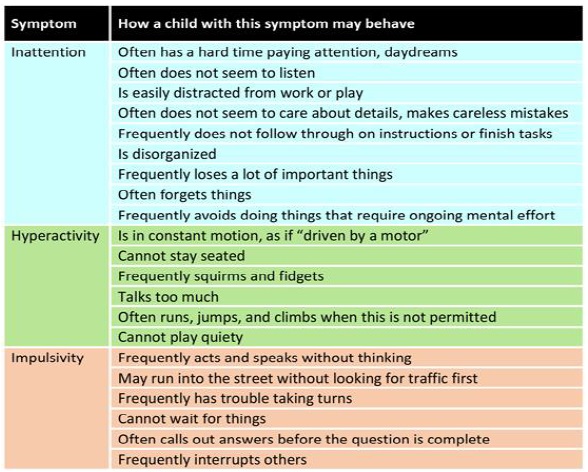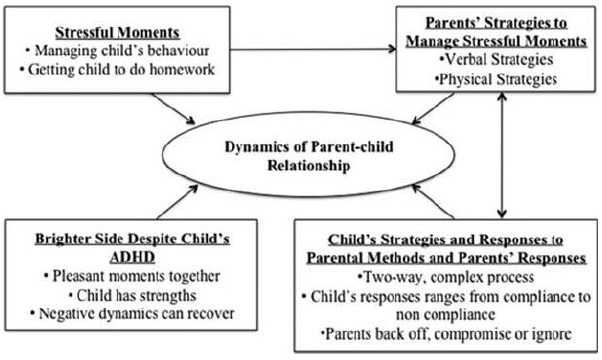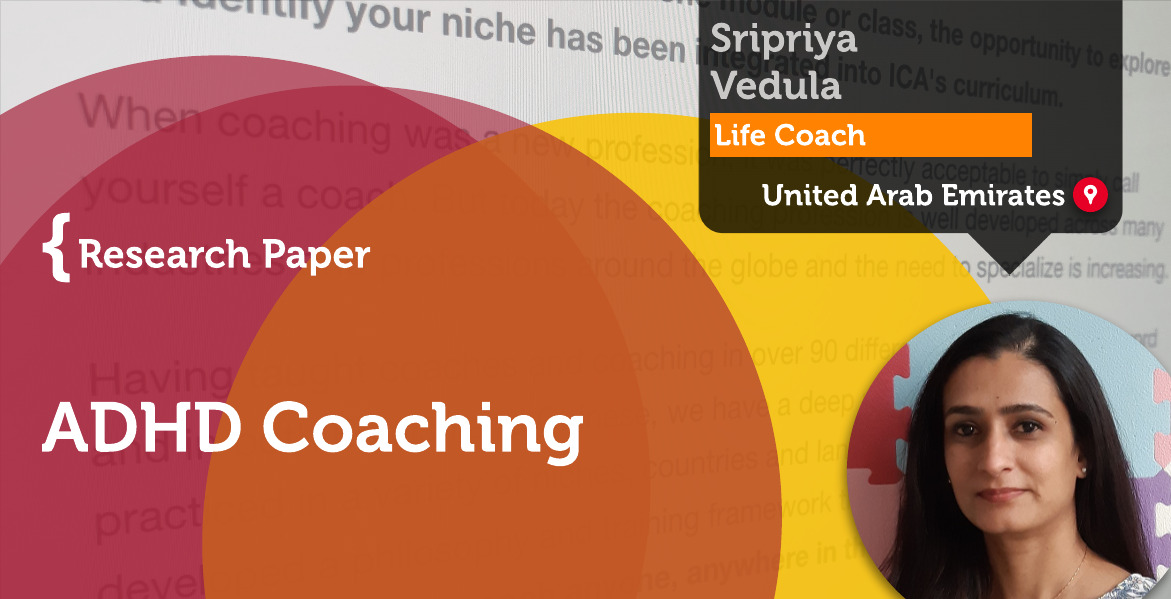Research Paper By Sripriya Vedula, Life Coach, UNITED ARAB EMIRATES
ADHD Coaching – Meet the Family
It was the family’s first meeting with the Coach. Ahmed was nervous, yet excited to meet this ‘friendly’ person, as quoted by his mother. The parents were anxious about how they would work together.
While talking to the coach, the following statements were noted:
| Ahmed’s Version | Parents Version |
|
What I like about school: Science because you learn about plants and animals. |
What does your child like about school: |
|
I need some extra help with (school): Maths. I don’t like it. It is very hard. |
Your child needs some extra help with ( school): |
|
At school, I behave: well. Because I try not to move around in my seat a lot. |
At school, he/she behaves: |
|
I am really good at coloring, singing, and swimming. My neighbor has a pool in summer. |
Your child is really good at: |
|
I need some extra help with (home): Nothing. I get scolded if I don’t understand some things. |
Your child needs some extra help with (home): |
|
During my free time: I like to watch scooby Doo. He is my favorite, but dad took him away. I like Cartoon Network and Nick (Nickelodeon). |
During free time: |
|
I really want my teacher to know about me: I know my fingers aren’t drumsticks but sometimes I can’t help tapping the table. To sit with my friends and not by myself. |
You really want your child’s teacher to know: We are doing our best to work on his behavior. Not every child is the same. We do realize he is an extra effort and can be stressful. |
|
I really want my parents to know about me: I really try hard. I don’t want to upset you. I love our Sunday picnics, don’t cancel them. |
You really want your child to know: We really love you and we would like you to be smarter and mindful. We would always want the best for you. |
Diagnosed with ADHD
Ahmed was 7 years old when he was diagnosed with ADHD, as well as auditory dysfunction by a neuropsychologist.
Despite not scoring well on an IQ test, he still managed to fall within the upper range of intelligence. His teachers thought he was a strong-willed child but struggled with a very short attention span, which often distracted him in the classroom.
Ahmed’s mother wanted him to be more loving and less selfish towards his sister & get along with his friends. She wanted him to be mindful and ‘in control’.
Ahmed wanted to focus better on his homework and complete them on time. However, he was developing low self-esteem and thought that he would never be able to do any better.
What Is Attention Deficit Hyperactivity Disorder (ADHD)?
It is a neurobehavioral developmental disorder, affecting preschoolers, children, adolescents, and adults, characterized by impulsiveness and inattention, with or without a component of hyperactivity. ADHD affects 3% to 7% of the population worldwide. ADHD is characterized by distractibility, hyperactivity, and impulsivity. The standard treatment for ADHD includes mainly medication, psychosocial and behavioral treatment, and cognitive training exercises.
ADHD in Children
ADHD is a common neurodevelopmental disorder that typically appears in early childhood, the primary symptoms include inattention and hyperactive-impulsive behavior. They appear before age 12, and in some children, they’re noticeable as early as 3 years of age. ADHD symptoms can be mild, moderate, or severe, and they may continue into adulthood.
Symptoms of ADHD

Emotional Effects of ADHD on a Child
- Aggressive or violent behavior
- Withdrawal, anxiety, or depression – mental health issues
- Low self-esteem, social anxiety
- Difficulties in processing an emotion – conceal them
- Develop trust issues
Parents vs ADHD Child:
Parenting children with ADHD can be quite challenging and this has been studied for many years. Earlier research focused on the diagnosis and treatment of ADHD and ignored the importance of support for families. It was later acknowledged that dysfunctional parenting can impact negatively the social functioning of a child with ADHD. Only then do the interventions to support parents in managing symptom control come into being.
Parents of a child with ADHD experience stress and struggle to cope with the child’s symptoms. This stress adds to the stigmatizing attitudes of other family and their community. It can get difficult for them to control their own emotions and can impact their social and occupational functioning.
Challenges of a Parent:
1. Parenting Stress
The research over many years has demonstrated increased stress in parents of children with ADHD compared with those of unaffected children. The very persona related to their perceptions, self-esteem, and mental stress was found as a strong correlation to their child’s behavior. The parent’s desire to control their child’s behavior was opposite to their self-esteem.
2. Academic-Related Stress
The academic struggle was found to top parental stress. Often these parents also attest to lower self-efficacy when it comes to supporting their children compared to their peers with typically developing children. Researchers argue that many students with ADHD have the intellectual capacity to perform academically but are faced with failure to complete homework, poor performance at school, missing deadlines for projects, and lack of promptness in handing in work. Children with ADHD require more instruction and support than their non-ADHD peers. However, in many cases, parents do not have the knowledge or skills to address this need. This is where supporting such parents become a major growth area.
3. Different Parenting Styles
Several studies demonstrate that particular styles of parenting can impact the parent-child relationship and outcomes. Parents who themselves struggle with self-discipline and impulsiveness fail to support their children with ADHD or even otherwise. The research revealed two types of parenting styles- one being ‘supportive’ and the other being ‘controlling’. The controlling style more often resulted in parents adopting negative strategies in managing the behavior of their children with ADHD which led to more symptoms such as inattention and hyperactivity. A supportive style, demonstrated by parents’ approval, interest, and validation of age-appropriate choices seemed to be linked to more positive outcomes.
4. Parent Cognitions
Having worked with such parents who experience struggle with their child, it was evident these parents lack the awareness and attention around applying the strategies to support their children with ADHD. This cognition suggests how they perceive their child’s behavior and how in turn they respond to it. For example – the parents who stay calmer are more forgiving and aware of their child’s condition. The opposite also applies when they believe misbehavior stems from a child’s choice.
Coaching a Parent of a Child with ADHD
ICF Core Competencies:
According to the International Coach Federation, coaching is defined as:
Partnering with clients in a thought-provoking and creative process that inspires them to maximize their personal and professional potential.
In coaching a parent, the most sensitive and vital competency would be a co-creating relationship with trust and intimacy. Ability to create a safe, supportive environment that produces ongoing mutual respect and trust. To build trust between both the coach and the parents, a session must demonstrate:
- Growth mindset & openness to potential new learning
- Collaboration on the child’s interest
- Acknowledgment and empathy
- Ability to innate intuition, energy, feelings, and instincts
- Focus on forwarding movement
- Positive Environment
- Energetic connection through verbal/non-verbal communication
- Mutual respect
Role of the Coach
ADHD is not just another word for bad parenting.
Parental skills and awareness, along with traits such as mindfulness and compassion have a significant positive impact on children with ADHD.
Coaching can support the parents on a more focused pathway to equip them with competence and awareness around dealing with their children. They would be more mindful of setting realistic goals for themselves and their child with ADHD. It is a distinct approach from other interventions, focusing on supporting them to develop their solution, giving way to a growth mindset, and challenging their perceptions around themselves and their children.
Coaching also focuses on the stress experienced by parents and creates a pathway for them to coach their children in finding ways to compensate for the challenges of ADHD. Coaching is always an opportunity to empower others by helping them to solve their problems, take responsibility for their learning, and find new opportunities to exert competent influence.

How Coaching Supports?
- Discover pathways a parent can use to support their child to develop from an emotionally-centered child into a confident, responsible, and mindful child.
- Building trust with deep listening and asking thought-provoking questions that connect them to their child’s abilities.
- Create effective short and long-term realistic goals with the child that are mutually beneficial and support their growth.
- Manage disruptive situations effectively with clear communication and emotional intelligence techniques.
- Develop a growth mindset that holds the capacity to stay resourceful during tense moments between the parent and the child.
- Build the ability to challenge themselves and the child in a positive way with communication techniques that allow for sincere and honest conversations.
- Practice powerful storytelling to engage the child’s imagination, develop their cognitive abilities as well as, and encourage a deep, loving connection between the parent and the child.
- Discover how to hold space for the child’s own self-empowerment which supports them in developing themselves as their own leader
Outcomes:
- Meaningful conversation between family members, especially the child with ADHD
- Build awareness & mindfulness
- Practice reflecting & less judgmental
- Accepting Responsibility & Consequences
- Conflict Resolution
- Exploring problem-solving abilities
- Making Decisions
- Help build self-esteem, resilience, and independence
- Anger Management
Children with ADHD
Being a parent is about making choices and, with a child with ADHD, these choices can be further challenging. The doubts will always show up as “what if they are wrong? How do I cope with the fear that I haven’t done something the right way?”
The coaching approach is a customized opportunity to support parents to understand the intense child’s behavior and learn what to do to help it improve dramatically. There’s no diagnosis from the coach; just solid, usable tools for bringing out the best in a parent and thus, in the child.
References
American Psychiatric Association – Diagnostic and Statistical Manual of Mental Orders, Fifth Edition (2013)
https://ro.ecu.edu.au/cgi/viewcontent.cgi?article=3033&context=theses
www.healthychildren.org
www.ncbi.nlm.nih.gov
www.chadd.org
https://www.additudemag.com/category/parenting-adhd-kids/
Ross W. Greene, The Explosive Child: A New Approach for Understanding and Parenting Easily Frustrated, Chronically Inflexible Children (2014)
https://www.additudemag.com/adhd-coaching-daniel-amen-treatment/
https://community.today.com/parentingteam/post/why-your-child-needs-a-coach-not-a-therapist
https://www.understood.org/pages/en/families/learning-thinking-differences
https://www.researchgate.net/figure/Bidirectional-dynamics-between-children-with-ADHD-and-their-parents_fig1_264866002
